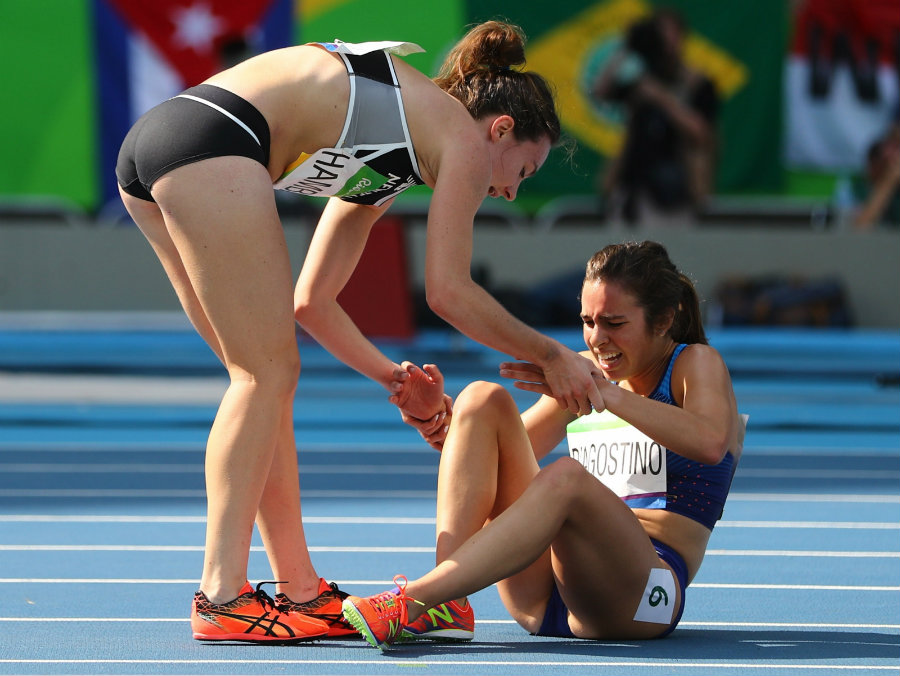The Olympic Games is not only about taking medals home. New Zealander Nikki Hamblin and American Abbey D’Agostino, the two athletes who helped each other finish the 5000m in Rio after a mid-race fall, received the International Fair Play Committee Award on Saturday night from the International Olympic Committee (IOC). They embodied the sportswomanship and the Olympic values as they decided to support each other instead of keeping up the fight for an individual victory.
The IOC’s vice-president Nawal El Moutawakel said the Rio games had served to remind the world of the power and magic sports compresses as he presented the awards. He added that the two athletes had shown apparent acts of “selflessness and exemplary sportsmanship.”

“We have been inspired by great moments of sportsmanship. Athletes are inspirational role models, and it is these moments of fair play that we have come together to celebrate today,” Nawal El Moutawakel expressed, as reported by The Guardian.
D’Agostino was running right behind Hamblin when the New Zealander tripped and fell, causing the American to fall on the side of her body. The U.S. competitor managed to get up and decided to help Hamblin, who was laying in the fetal position on the track apparently defeated as she wondered what was going on. The two continued the race together, but D’Agostino was in severe pain because she had twisted her right leg badly as a result of the fall and fell again to the ground moments later.
Hamblin chose to stop running and reach for D’Agostino to support her and the pair finished the race side by side. The pair were photographed as they embraced closely and then D’Agostino was taken away in a wheelchair for treatment. They could not meet the qualifying time for the 5000m heat, but their teams filed protests, and the girls were allowed to be included on Friday’s 5,000m final. However, D’Agostino was not fit to take part.
“When I went down it was like, ‘what’s happening? Why am I on the ground?’” Hamblin said after the race, according to The Guardian. “And suddenly there’s this hand on my shoulder, like ‘get up, get up, we have to finish this!’ I’m so grateful for Abbey for doing that for me. That girl is the Olympic spirit right there.”
Hamblin noted that the two athletes, who are strong competitors, had never met before, and that made everything so amazing. The New Zealander said after Saturday night’s ceremony in Rio de Janeiro that neither of them had expected to experience such a moment in their Olympic Games because, like any other athlete, they wanted to do their best on the track. Still, she expressed that the race had been very special for both of them, who understood what it had taken for the other to get there.
“When I look back on Rio 2016, I’m not going to remember where I finished, I’m not going to remember my time … but I’ll always remember that moment,” she told New Zealand’s Breakfast radio host Mike Hosking about the moment of solidarity and kindness. “If I hadn’t waited for her or tried to help her I would have been 10 or fifteen seconds quicker and what does that matter?,” the athlete concluded.

PV Sindhu also made history as she picked up Carolina Marin’s racquet
PV Sindhu became the first Indian woman athlete to earn a silver medal at Olympics after a loss against Carolina Mari from Spain. Sindhu made headlines not only by making her country proud but also by showing profound love for the sport and true respect for her strong opponent.
The Indian athlete went to congratulate Carolina Mari. She lifted her onto her feet and embraced her. But she felt that was not enough and decided to have one more kind gesture. Sindhu left the center court, picked up Carolina’s racquet and placed it near the kit of the Spanish athlete, who had thrown her racquet in the air out of excitement after she won the match point.
Olympic spirit among women before Rio 2016
American swimmer Dara Torres won the semifinal of the 50 freestyle at the 2008 Olympics in Beijing moments after she helped Sweden’s Therese Alshammar, who was in trouble because she heard a ripping sound coming from her swimsuit just instants before the competition.
Torres noticed the trouble her fellow competitor was in and tried to stitch up the swimsuit herself. She realized she could not solve the problem and asked an official to delay the race until Alshammar could change. There was no award for Torres, but she won the race with a good feeling of having done something kind for another competitor.
The next story also includes a US athlete. Marathoner Cathy O’Brien was leading the race during the qualifier for the Barcelona Olympic Games in 1991, but Janis Klecker had slipped on the track and O’Brien decided to stop to help her. Klecker won the race, and O’Brien suffered from cramps just instants before getting to the finishing line. Still, O’Brien’s attitude towards Klecker won her the Fair Play Award, which she received from the United States Olympic Committee.
And in 1932, Judy Guinness from Britain was about to receive the individual foil gold medal during a match against Ellen Preis from Austria when she chose to point out that the judges had failed to award two points to the Austrian girl. Noticing and saying something about that mistake resulted in Preis winning gold and Guinness going home with silver.
Source: TIME
